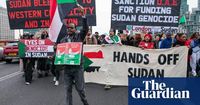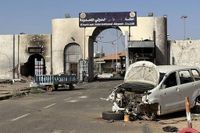The United Arab Emirates is under increasing international scrutiny following a leaked UN report that raises serious questions about its involvement in the ongoing conflict in Sudan. The document, acquired by the Guardian, details a series of suspicious cargo flights from the UAE to Chad, which reportedly avoided detection and are believed to be linked to arms smuggling operations supporting Sudanese paramilitary groups.
According to the confidential report, UN investigators tracked numerous flights of Ilyushin Il-76TD aircraft departing from UAE airports and landing at airbases in Chad. These routes coincide with known smuggling paths that funnel weapons into Sudan. Despite the alarming patterns observed, the report did not definitively confirm the contents of the cargo, although the flight behavior—specifically, the planes disappearing from tracking systems during critical segments—has raised concerns about possible covert military operations.
The UAE has categorically denied the allegations of arming factions in Sudan, especially the Rapid Support Forces (RSF), which have been engaged in a brutal conflict with Sudan’s military since April 2023. This ongoing war has resulted in the displacement of over 12 million people and has triggered a catastrophic humanitarian crisis.
As the situation escalates, UK Foreign Secretary David Lammy faces a diplomatic dilemma. He has invited 20 countries, including the UAE, to a peace conference scheduled for today, April 15, 2025, at Lancaster House. This meeting coincides with the second anniversary of the war's outbreak. A senior diplomat familiar with the situation expressed concern, stating, "The UK needs to explain how it is responding to massacres of children and aid workers while hosting the UAE at its London conference."
The leaked 14-page report described the UAE-Chad air corridor as forming a "new regional air bridge," indicating a systematic pattern of flights. Although the report flagged at least 24 flights believed to be linked to potential arms smuggling to the RSF, the final comprehensive document, set for release in the coming days, reportedly makes no mention of these flights or the UAE's involvement, citing a lack of conclusive evidence.
This development comes in the wake of a weekend of violence in which RSF fighters allegedly killed over 200 civilians, many of whom were from ethnic communities in displacement camps near El Fasher, the last major city in Darfur still under the control of Sudan's military. A senior diplomat warned, "It will be shameful if the conference does not deliver concrete civilian protection in the context of ongoing genocide." Sudan has accused the UAE of supplying arms to the RSF, a charge that has garnered support from UN experts and US lawmakers, leading Sudan to take a case against the UAE to the International Court of Justice in The Hague. The UAE has denied these allegations and requested that the case be dismissed.
Pressure continues to mount on the UAE as the conference unfolds. The leaked internal UN report, marked highly confidential, indicated that multiple flights from the UAE made deliberate attempts to avoid detection as they flew into bases in Chad, where arms smuggling into Sudan has been monitored. This has complicated matters for Foreign Secretary Lammy, who has invited the UAE to participate in peace talks amid allegations of its involvement in the conflict.
The 14-page report, completed in November and sent to the Sudan sanctions committee of the UN Security Council, documented a consistent pattern of Ilyushin Il-76TD cargo flights originating from the UAE into Chad. The experts identified at least three overland routes that could potentially be used for transporting weapons into Sudan. They noted that the frequency of these cargo flights had created a "new regional air bridge," raising alarms about the UAE's role in the ongoing conflict.
While the report highlighted peculiarities in the flights—such as planes disappearing for crucial segments of their journey—the experts admitted they could not definitively identify the contents of the cargo or locate any direct evidence of weapons being transported. The findings of these numerous flights from the UAE to Chad are notably absent from the final report of the UN expert panel on Sudan, which is due to be published shortly.
As the international community watches closely, the allegations against the UAE arrive after a weekend marked by violence in which RSF fighters reportedly killed over 200 civilians. In January 2025, the US formally declared that the RSF had committed genocide in Sudan, further complicating the UAE's position at the peace conference.
In their November update, the UN experts identified at least 24 Ilyushin Il-76TD cargo flights that landed at Amdjarass airport in Chad last year. These flights coincided with an escalation of fighting in El Fasher, particularly a surge in drone activity primarily by the RSF for combat and intelligence purposes. The arrival of these flights marked a new technological phase in the conduct of hostilities.
Some of the flights identified in the report were linked to operators previously connected to military logistics and illicit arms transfers. The experts also examined regular departures into Chad from two UAE airports—Ras Al-Khaimah and Al Ain—and found that the flights frequently disappeared from radar during crucial moments. One instance described a flight that left Ras Al-Khaimah, vanished mid-flight, and later resurfaced in N’Djamena, the capital of Chad, before returning to Abu Dhabi.
Despite the alarming patterns and anomalies observed, the UN experts concluded that the evidence gathered did not meet the necessary standards to establish a clear link between the documented flights and alleged arms transfers. They emphasized that while the flights marked an important new trend, the lack of triangulated evidence to confirm the nature of the cargo transported rendered it premature to infer that these flights were part of an arms transfer network.
The revelations come just days after the International Court of Justice heard a case brought by Sudan, accusing the UAE of complicity in the genocide during the ongoing conflict. The UAE has dismissed the case as a cynical publicity stunt and a platform for false attacks against them. A UAE source noted that the confidential UN expert report contained a disclaimer stating that four of the five panel members felt that the allegations of an air bridge from the UAE to Sudan via Chad did not meet the evidentiary standards required to establish a clear link between the documented flights and the alleged transfer of arms.
In a statement, the UAE emphasized that the imminent final report from the Sudan expert panel did not reference the Emirates in relation to any flights, asserting that the allegations against them failed to meet the panel’s evidentiary threshold. The UAE reiterated that the record speaks for itself, maintaining that there is no substantiated evidence that they have provided any support to the RSF or have any involvement in the conflict.


